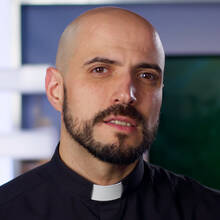A Reflection for Wednesday of the Fifteenth Week in Ordinary Time
Find today’s readings here.
At that time Jesus exclaimed: I give praise to you, Father, Lord of heaven and earth,
for although you have hidden these things
from the wise and the learned
you have revealed them to the childlike. (Mt 11:25)
Almost instinctively, when I encounter words like ‘child,’ ‘children,’ and ‘childlike’ in the Scriptures, they trigger an insight my Scripture professor would often repeat during my theology studies in Brazil.
My teacher maintained that whenever we came across these words, or concepts connected to them, they should cause us to think of the concept of the anawim mentioned in the Hebrew Scriptures, which itself acts as a placeholder to refer to those who are humble, vulnerable, oppressed and marginalized, and are often exemplified by the person of the stranger, widow, orphan and child. We are especially to consider the attitudes that distinguish the anawim, the poor of God, from those who are learned and wise, proud and self-sufficient: humility, vulnerability, dependence on God and a willingness to trust in God’s goodness and provision. These are the attitudes we are to cultivate, and pray for the grace to have within ourselves, if we want to have the things of God revealed and not hidden from us.
The Eucharistic Congress, a major milestone in the U.S. bishops’ three-year initiative for Eucharistic revival, begins today. Over the next five days, I will join thousands of fellow Catholics from across the country at Lucas Oil Stadium in Indianapolis to reflect on the significance of the Eucharist, attend catechetical sessions and workshops, receive the Sacrament of Reconciliation, celebrate Mass and pray together in Eucharistic adoration.
One of the reasons our bishops give for embarking upon such a project of revival around the Eucharist at this time is a concern that the majority of Catholics do not understand the mystery of the real presence espoused in Catholic theology. After a 2019 Pew Research Center survey revealed that only 31 percent of Catholics in the U.S. believe that the Eucharist is the actual body and blood of Jesus Christ, while 69 percent view the Eucharist as merely a symbol of Christ’s presence—a nuance that may not be fully captured by survey questions or understood by survey respondents—the need for a renewed focus on this fundamental tenet of Catholic teaching became clear.
The survey’s findings highlighted for the bishops a significant knowledge gap and a disconnect from traditional Catholic doctrine, prompting them to initiate a nationwide effort to rekindle a deeper understanding and appreciation of the Eucharist.
A revitalized understanding, knowledge and appreciation of this sacred sacrament can indeed deepen our faith and strengthen our connection to the church’s teachings—a hope I sincerely share in. Yet, as the bishops have aptly emphasized through this congress, we must remember that our ultimate goal is not merely to acquire knowledge of the Eucharist, but to experience it firsthand. For the Eucharist is only truly understood and appreciated when it is lived and celebrated together, leading us to be “sent out on mission ‘for the life of the world,’” as the third phase of the Eucharistic Revival so aptly invites us to do.
Our gathering as people from diverse backgrounds, cultures, sexualities and political convictions is, in itself, a testament to the power the Eucharist has to unite. As we come together in our shared faith, we embody the very spirit of the Eucharist. I am reminded of St. Augustine’s profound sermon, which invites us to “become what we receive” in the Eucharist—and what we receive is the body and blood of Jesus, who was rejected, despised, marginalized and humbled for our sake, that we might live life to the full and, in turn, bring others to experience this transformative gift of God’s sacrifice.
And who more important to draw into the mystery of God’s presence than the anawim of our world? The ones who are often marginalized, overlooked and excluded: the refugees and asylum seekers, the incarcerated, L.G.B.T.Q. persons, the divorced and remarried, and all those who have been wounded and excluded by the church or society. It is precisely these vulnerable and fragile people that Jesus sought out and embraced, and whom we are called to welcome and include in our celebration of the Eucharist. Only by doing so do we fulfill the vision of the Eucharistic Revival:
To inspire a movement of Catholics across the United States who are healed, converted, formed, and unified by an encounter with Jesus in the Eucharist—and who are then sent out on mission “for the life of the world.
Can we be childlike enough to trust in the power the Eucharist that we share has to heal us of our divisions, turn us into what we receive, that we might go out on mission to bring God’s love and special care to those most in need?







